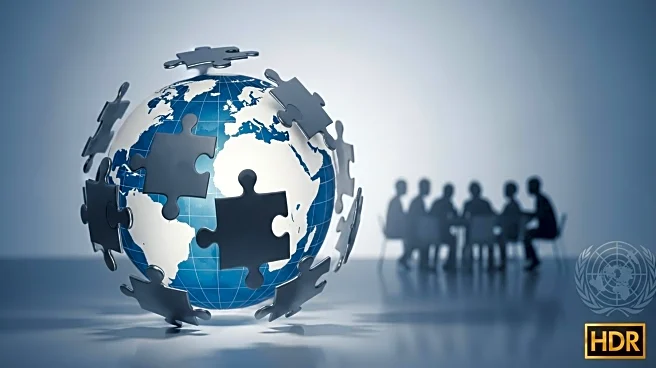What's Happening?
The 80th session of the United Nations General Assembly in New York has been marked by discussions on the impact of recent U.S. foreign aid cuts. President Trump’s decision to reduce billions in assistance has created anxiety among global health leaders. Solomon Zewdu, CEO of The END Fund, highlighted the fragmented conversations among leaders, emphasizing the urgency to address health issues without waiting for future summits. Varnee Murugan from the U.S. Chamber of Commerce noted a shift towards involving private-sector companies in global health strategies. Atul Satija from the Nudge Institute observed deeper conversations focused on global problems and solutions. Peter Sands, CEO of the Global Fund, described the situation as a 'moment of reckoning,' balancing funding cuts with scientific innovations. Jackie Aldrette from AVSI-USA expressed concern over the U.S.'s diminished role but found hope in collaborative efforts.
Why It's Important?
The reduction in U.S. foreign aid has significant implications for global health initiatives, affecting healthcare and education opportunities worldwide. The shift towards private-sector involvement could lead to sustainable trade and economic growth, but also raises questions about the role of profit-driven entities in public health. The discussions at the General Assembly highlight the need for innovative solutions to mitigate the impact of funding cuts. The absence of U.S. leadership in these discussions may alter the dynamics of international aid and collaboration, potentially leading to new alliances and strategies among global health organizations.
What's Next?
Global health leaders are expected to continue exploring alternative funding sources and strategies to address the challenges posed by U.S. aid cuts. The emphasis on private-sector involvement may lead to new partnerships and initiatives aimed at sustainable development. Organizations like the Global Fund will focus on raising funds for future cycles, while others may seek to strengthen collaborative efforts to ensure continued support for marginalized communities. The evolving landscape of international aid could result in shifts in policy and priorities at future summits.
Beyond the Headlines
The discussions at the UN General Assembly reflect broader ethical and strategic considerations in global health. The reliance on private-sector solutions raises questions about the balance between profit and public good. The diminished role of the U.S. in international aid may prompt a reevaluation of global leadership and influence, potentially leading to more diverse and inclusive decision-making processes. The focus on scientific innovations amidst funding cuts highlights the potential for technological advancements to drive progress in health outcomes.












